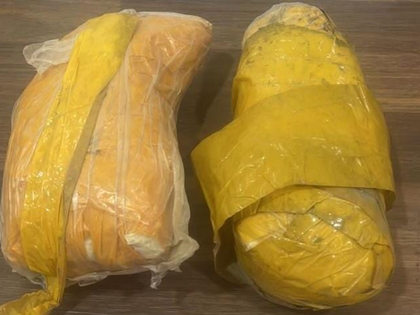Haryana narcotics bureau intensifies action against drug traffickers
By IANS | Updated: November 7, 2025 14:25 IST2025-11-07T14:20:49+5:302025-11-07T14:25:07+5:30
Chandigarh, Nov 7 With the goal of making the state drug free, the Haryana State Narcotics Control Bureau ...

Haryana narcotics bureau intensifies action against drug traffickers
Chandigarh, Nov 7 With the goal of making the state drug free, the Haryana State Narcotics Control Bureau has intensified decisive action against drug traffickers' online networks and financial infrastructure.
Chairing the fifth bi-monthly review meeting on Friday, Director General of Police O.P. Singh emphasised that Haryana Police will no longer limit its operations to mere seizures of narcotics, but will also dismantle the sources, networks, and funding channels behind drug trafficking.
During the meeting, several key priorities were set for the coming months, including increased surveillance on cyber and online drug transactions, strengthening inter-agency coordination at the state and central levels, detailed investigations into money trails, and intensified public awareness campaigns across villages to safeguard youth from addiction.
Additionally, a monthly performance review and incentive-based evaluation system for all units will be implemented.
From January to October, the bureau registered 232 FIRs and arrested 422 accused persons. Of these, 63 cases involved commercial quantity drugs, representing 16.22 per cent of all such cases registered across Haryana.
The bureau made significant seizures of pharmaceutical drugs, opium, poppy straw, and charas (hashish), underscoring the bureau's focus on both traditional and emerging drug threats. Since 2020, the bureau has registered 1,712 FIRs and arrested 2,994 accused persons. These include 264 commercial quantity (CQ), 1,051 intermediate quantity (IQ), and 397 small quantity (SQ) cases.
Between January and October, a total of 3,007 NDPS cases were registered across Haryana, involving 5,378 arrests. Of these, 63 CQ cases were registered by the bureau, accounting for 16.22 per cent of all such cases in the state.
In the inter-state and international action, the Haryana Police have taken stringent measures against drug networks. Between January and October 2025, 436 inter-state and 27 international traffickers were arrested.
The inter-state arrests involved offenders from Uttar Pradesh, Punjab, Rajasthan, and Delhi, while 22 of the international arrests were Nigerian nationals. Preventive actions under the PITNDPS Act have been prioritised.
Sixty-two offenders have been detained under preventive detention orders, mostly from Dabwali, Kaithal, and Fatehabad districts, demonstrating the bureau's consistent commitment to curbing repeat offenders.
Striking at the financial backbone of drug traffickers, assets worth over Rs 10.43 crore belonging to 104 traffickers have been identified and frozen under Section 68F of the NDPS Act in 2025 alone.
From 2022 to 2025, a total of 113 such properties were identified and destroyed. These actions mark a significant step toward dismantling the economic framework of the drug trade in the state. The crackdown will continue relentlessly.
Between January and October, out of 1,185 NDPS cases adjudicated across Haryana, 575 convictions were secured.
The bureau now emphasises comprehensive investigations rather than surface-level inquiries. Recent cases, such as one involving 11 linked arrests, highlight the Bureau’s focus on both source and destination of the drug supply chain.
DGP Singh issued clear and firm directions to all officers, reaffirming that the bureau's approach against drugs is uncompromising and decisive.
"Our mission is not only to arrest offenders but to completely dismantle the entire ecosystem of drug trafficking - be it cyber networks, funding channels, or on-ground gangs. This is not merely a duty but a moral responsibility toward our society," he was quoted as saying.
He further cautioned that any negligence or laxity in anti-drug operations will invite strict action and accountability.
Each unit incharge was instructed to treat every case as a 'model case', ensuring integrated and effective efforts in investigation, seizure, follow-up, and public awareness.
Disclaimer: This post has been auto-published from an agency feed without any modifications to the text and has not been reviewed by an editor
Open in app